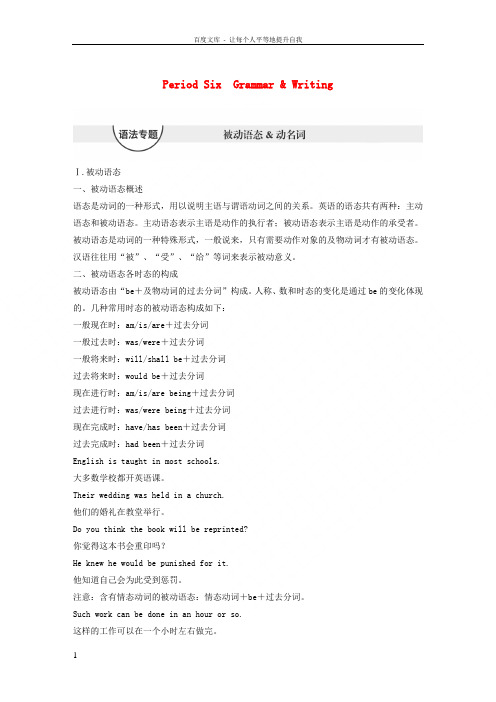高中英语Unit11 单元语法一_被动语态学案含解析北师大版必修4
- 格式:doc
- 大小:249.00 KB
- 文档页数:6

Unit 11 The Media 语法篇____________________________________________________________________________________________________________________________________________________________________1.被动语态。
一,2.动名词。
二,被动语态当句子的主语是动作的承受者时, 谓语部分需用被动语态形式, 即“系动词be+过去分词”。
1.例: English is spoken all over the world today.被动语态常用于需要强调动作的承受者;不知道谁是动作的执行者, 没有必要说出动作的执行者以及科技文章中。
2.例: The bridge was made of stones.3.各种时态的被动语态时态被动语态一般现在时am/is/are + 过去分词一般过去时was/were + 过去分词一般将来时will be + 过去分词过去将来时would be + 过去分词现在进行时am/is/are + being + 过去分词过去进行时was/were + being + 过去分词现在完成时have/has + 过去分词过去完成时had been + 过去分词例: I f they are caught, they will die.We shall be punished if we break the rule.A computer center is being built for the students.All the broken windows have been repaired.4.被动语态的特殊结构①含有情态动词的被动语态。
其结构为: can/may/must/need/should/…+ be + 过去分词例: The children should be taken good care of.②带有双宾语动词的被动语态, 一般是把间接宾语变为被动语态的主语, 另一宾语仍然保留在谓语后面。


Unit 11 The MediaPeriod Five Communication Workshop, Culture Corner & Bulletin BoardⅠ.重点单词1.ahead adv. 在前面2.tobacco n. 烟草,烟叶3.section n. 部分,片段4.false adj. 错误的;不真诚的5.royal adj. 王室的;皇家的6.editor n. 编辑;剪辑者→edit v. 编辑→edition n. 版;版本7.harmful adj. 有害的→harm n. & v. 伤害8.faithfully adv. 忠实地,真诚地→faithful adj. 忠实的→faith n. 信任,信条9.unemployment n. 失业(状态)→unemploy v. 使失业→employ v. 雇用10.interrupt v. 打断(讲话或动作);打扰→interruption n. 打断11.environmental adj. 自然环境的→environment n. 环境12.protection n. 保护,防卫→protect v. 保护13.inconvenient adj. 不方便的→inconvenience n. 不方便14.independent adj. 独立自主的→independence n. 独立自主Ⅱ.核心短语1.be_against反对2.go_ahead_with 开始做,着手干3.be_popular_with 受到……的欢迎4.even_if/though 即使,纵然5.be_harmful_to 对……有害6.be satisfied with 对……感到满意7.have an effect on 对……有影响8.owe...to... 把……归功于……9.come out 结果是……10.in one's opinion 按照某人的看法,在某人看来Ⅲ.经典句式1.“no matter+疑问词”引导让步状语从句No matter what the government says, it is clear that the airport will also affect our health.无论政府说什么,显而易见,机场还会影响我们的健康。


Period Six Grammar & WritingⅠ.被动语态一、被动语态概述语态是动词的一种形式,用以说明主语与谓语动词之间的关系。
英语的语态共有两种:主动语态和被动语态。
主动语态表示主语是动作的执行者;被动语态表示主语是动作的承受者。
被动语态是动词的一种特殊形式,一般说来,只有需要动作对象的及物动词才有被动语态。
汉语往往用“被”、“受”、“给”等词来表示被动意义。
二、被动语态各时态的构成被动语态由“be+及物动词的过去分词”构成。
人称、数和时态的变化是通过be的变化体现的。
几种常用时态的被动语态构成如下:一般现在时:am/is/are+过去分词一般过去时:was/were+过去分词一般将来时:will/shall be+过去分词过去将来时:would be+过去分词现在进行时:am/is/are being+过去分词过去进行时:was/were being+过去分词现在完成时:have/has been+过去分词过去完成时:had been+过去分词English is taught in most schools.大多数学校都开英语课。
Their wedding was held in a church.他们的婚礼在教堂举行。
Do you think the book will be reprinted?你觉得这本书会重印吗?He knew he would be punished for it.他知道自己会为此受到惩罚。
注意:含有情态动词的被动语态:情态动词+be+过去分词。
Such work can be done in an hour or so.这样的工作可以在一个小时左右做完。
三、主动语态变为被动语态的方法1.把主动语态的宾语变为被动语态的主语。
2.把谓语变成被动结构,时态不变。
3.有时把主动语态中的主语放在介词by之后作宾语,原作主语的人称代词要用宾格。
All the people laughed at him.→He was laughed at (by all the people).They were building the new bridge.→The new bridge was being built (by them).We haven’t told her about it yet.→She hasn’t been told about it yet.四、使用被动语态的场合1.不知道或没有必要指出谁是动作的执行者时。

SectionⅠTopicTalk&Lesson1LivinginaCommunity一、单句语法填空1.You’d better spare more time to negotiate your son.2.The patient was so weak that he even couldn’t blow the candle .3.Seeing her son in danger,she rushed to him a flash.4.He was so selfish that I couldn’t tolerate (work) with him!5.After a long discussion,they finally came to a(resolve).6.Flights should be confirmed 48 hours before(depart).二、完成句子1.It was in the morning that(他打包了所有行李).2.If(我没有犯这样的错误),I could have completed the assignment better.3.She sat at the river,(回忆着幸福的童年).4.Many forms of cancer can be cured(如果发现得早).5. (让我苦恼的是) was that my son didn’t spend much time on his lessons.6.Who do you think in our company can(解决这个问题)?三、阅读理解On March 7,1907,the English statistician Francis Galton published a paper which illustrated what has come to be known as the “wisdom of crowds” effect.The eation he conducted showed that in some cases,the average of a large number of independent estimates could be quite accurate.This effect capitalizes on the fact that when people make errors,those errors aren’t always the same.Some people will tend to overestimate,and some to underestimate.When enough of these errors are averaged together,they cancel each other out,resultingin a more accurate estimate.If people are similar and tend to make the same errors,then their errors won’t cancel each other out.In more technical terms,the wisdom of crowds requires that people’s estimates be independent.If for whatever reasons,people’s errors become correlated or dependent,the accuracy of the estimate will go down.But a new study led by Joaquin Navajas offered an interesting twist(转折) on this classic phenomenon.The key finding of the study was that when crowds were further divided into smaller groups that were allowed to have a discussion,the averages from these groups were more accurate than those from an equal number of independent individuals.For instance,the average obtained from the estimates of four discussion groups of five was significantly more accurate than the average obtained from 20 independent individuals.In a follow-up study with 100 university students,the researchers tried to get a better sense of what the group members actually did in their discussion.Did they tend to go with those most confident about their estimates?Did they follow those least willingto change their minds?This happened some of the time,but it wasn’t the dominant response.Most frequently,the groups reported that they “shared arguments and reasoned together”.Somehow,these arguments and reasoning resulted in a global reduction in error.Although the studies led by Navajas have limitations and many questions remain,the potential implications for group discussion and decision-making are enormous.1.What is paragraph 2 of the teethods of estimation.B.The underlying logic of the effect.C.The causes of people’s errors.D.The design of Galton’s experiment.2.Navajas’studyfoundthattheaverageaccuracycouldincreaseevenif.A.thecrowdswererelativelysmallB.therewereoccasionalunderestimatesC.individualsdidnotcommunicateD.estimateswerenotfullyindependent3.Whatdidthefollow-upstudyfocuson?A.Thesizeofthegroups.B.Thedominantmembers.C.Thediscussionprocess.D.Theindividualestimates.4.Whatistheauthor’sattitudetowardNavajas’studies?A.Unclear.B.Dismissive.C.Doubtful.D.Approving.四、七选五阅读理解It is not so easy to disagree with your parents.Here are a few quick tips on how to show your opinion in the right way.1 Don’t let angry words fly out of your mouth if you don’t really want to say them,or you will have a lot of work to do later.2 How would you feel if you were your mother or father?Why do they do that?Is it really bad?Try to stay calm.If you find yourself getting too angry,ask for a short time to be alone. 3Learn to listen.Maybe your parents aren’t as persuasive(具有说服力的) as you think. 4Pay attention to needs rather than problems. 5 Tell your parents that you want to discuss the problem with them rather than work against them.A.Think before you speak.B.Never listen to your parents.C.It is quite common to disagree with one’s parents.D.Think about the problem from your parents’ point of view.E.Hear them out and then decide how to deal with the problem.F.Be clear about what you need,rather than focus on why you disagree.G.If you can,try to discuss the problem with your parents at another time.五、完形填空A mother and her daughter living in my community are two of the most unfriendly people I have ever come across in my life.They are totally separated,mie they have is making a nuisance(令人讨厌的人) of themselves to the local police station by 2 music played too loud,dogs barking more than once a day and any other pretty little gripe(不满).On moving into this neighbourhood,I was 3 of these two but decided I would make up my own mind.This proved quite a 4 to me as more than once either the mother or the daughter would knock on my door and blast(猛烈抨击) me with some 5 or other.I 6 answered politely and made sure I greeted them as they went past my place and also made the effort now and then to make a 7 remark about their garden or pets.Time passed by.Their 8 remained unchanged,however,and I continued to be as friendly as possible.During the New Year’s Day,we decided once again to 9 these two unhappy ladies to our list and left a packet of cookies on their gate.Imagine my 10 when two days later they stopped at my gate and 11 said they were considering hanging their gifts on their gate,and they brought me a bunch of flowers!So,my fellow gifters,do not 12 on your random gifts of kindness.You may never know just what this 13 to others,nor how many broken-hearted or 14 people you may just change with a simple act of 15 .1.A.nobody B.someoneC.anyoneD.nothingposing B.requestingC.reportingD.getting3.A.accused B.warnedC.remindedD.convinced4.A.challenge B.jobC.taskD.matter5.A.jokes B.adviceC.eplaints6.A.seldom B.neverC.alwaysD.sometimes7.A.kind B.rudeC.sympatheticD.approving8.A.smile B.attitudeC.decisionD.anger9.A.add B.recommendC.reduceD.drive10.A.interest B.smileC.surpriseD.face11.A.angrily B.jokinglyC.anxiouslyD.seriously12.A.take in B.take upC.give inD.give up13.A.refers B.meansC.relatesD.contributes14.A.kind-hearted B.light-heartedC.hard-heartedD.warm-hearted15.A.sorrow B.hopeC.imaginationD.kindnessSectionⅠTopicTalk&Lesson1LivinginaCommunity一、1.with 2.out 3.in 4.working 5.resolution6.departure二、1.he packed all his luggage 2.I hadn’t made such a mistake3.recalling her happy childhood4.if detected early5.What bothered me6.resolve the problem三、1.B 段落大意题。
语法·剖析·活用被动语态本单元我们主要讨论被动语态的时态问题:时态结构一般现在时am/is/are done一般过去时was/were done一般将来时is going to/will/shall+bedone现在进行时am/is/are being done过去进行时was/were being done现在完成时has/have been done过去完成时had been done含有情态动词can/may/must...be done注意:要特别留心的是被动语态的进行时态:be being doneThey are repairing the street this month。
→The street are being repaired this month。
They were cooking dinner when I arrived.→Dinner was being cooked when I arrived。
动名词动名词是由动词词尾加—ing而来,在句子中可以作主语、宾语、表语、定语和补语。
现列表举例如下:功用例句主语(真正的主语,形Saving is having。
节约即是收入。
式主语)It’s great fun sailing a boat.扬帆驾舟是十分有趣的。
宾语(实义动词的宾语,介词的宾语)You should try to avoid making such mistakes.你应该试着避免这种错误。
Are you afraid of being left alone at home?一个人被留在家里,你害怕吗?表语His job is covering and reportingemergency events.他的工作就是采访和报道紧急事件.定语Let's have a rest in the waitingroom。
我们去候车室歇会儿吧。
高中英语学习材料(灿若寒星*制作整理)随堂演练及时体验巩固提升Ⅰ.单句语法填空(不多于3个单词)1.They demanded that the books ________ (return) to the school library at once.答案与解析(should) be returned demand后接宾语从句时,从句中的谓语动词应用“should+动词原形”,should可省略。
句中的return与books之间存在动宾关系,故用被动形式。
2.I'm firm in my belief ________ he is a promising basketball player.答案与解析that in the/one's belief that ...“相信;怀有……的信念”。
句意:我坚信他是一名有前途的篮球运动员。
3.All of my family are greatly delighted ________ (learn) that you are getting along very well with your lessons.答案与解析to learn句意:我们全家人获悉你学习顺利的消息后都特别高兴。
be delighted to do sth.为固定搭配,意为“高兴做某事”。
4.The letters CPC stand ________ the Communist Party of China.答案与解析for句意:字母CPC代表中国共产党。
因此应选stand for表“代表”。
5.— Michael was late for Mr. Smith's oral class this morning.— ________ come? As far as I know, he never came late to class.答案与解析How How come?常用于口语,表示惊讶,意为“为什么?怎么搞的?”6.________ is mentioned above, the number of the students in senior high school is increasing.答案与解析As虽说which, as都可以引导非限制性定语从句,又可代替整个句子内容,但有下列区别:as引导的非限制性定语从句可放于句首,而which引导的则不能;as引导的定语从句有“正如”之意,而which引导的则没有。
Unit 11 The MediaPeriod Six Grammar单元语法(一)——被动语态[语法图解][语法感悟]单句语法填空1.The Group of Eight, or G8, was_formed (form) by eight of the world's wealthiest nations in 1998.2.The G8 is_made (make) up of political leaders from France, the United States, Britain, Germany, Japan, Italy, Canada and Russia.3.It is going to be remembered as a historical meeting this year, as the topic of Africa will_be_discussed (discuss) in detail.4.Reforms have_been_demanded (demand) by people all over the world.5.We can't use the bridge now, because it is_being_repaired (repair).一、动词语态的基本概念语态是动词的一种形式,用来表明主语与谓语动词之间的关系。
英语动词有两种语态,主动语态(Active Voice)和被动语态(Passive Voice)。
主动语态表示主语是动作的执行者,被动语态表示主语是动作的承受者。
同一件事往往既可以用主动句又可以用被动句来表达,但侧重点有所不同。
一般来说,主动语态侧重于行为者即动作的发出者,而被动语态侧重于动作的对象即动作的承受者。
They have caught a snake.他们抓住了一条蛇。
All the old houses along the street have been pulled down.沿街所有的旧房子都已经被拆掉了。
二、被动语态的构成被动语态的基本形式是由“助动词be+及物动词的过去分词”构成。
时态被动语态的构成一般现在时is/am/are+动词的过去分词一般过去时was/were+动词的过去分词一般将来时will+be+动词的过去分词;is/am/are+going to be+动词的过去分词过去将来时would be+过去分词现在进行时is/am/are+being+动词的过去分词过去进行时was/were+being+动词的过去分词现在完成时have/has+been+动词的过去分词过去完成时had+been+动词的过去分词含情态动词情态动词+be+动词的过去分词我们的教室每天都被打扫。
My bike is being repaired by Tom now.我的自行车现在正在被汤姆修理。
This book has been translated into many languages.这本书已经被翻译成了许多种语言。
Young trees must be watered often.小树一定要经常被浇水。
The topic was talked about at the last meeting.这个话题在上次的会议上就讨论了。
He knew he would be punished for it.他知道自己会为此受到惩罚。
[即学即用1] 单句语法填空1.The lost boy hasn't_been_found (not find) so far.2.Last year a large number of trees were_cut (cut) down.3.The students are often told (tell) to take care of their desks and chairs.4.The old man is ill. He must_be_sent (must send) to the hospital.5.It's said that the long bridge will_be_built (build) in two months.三、被动语态主要用于以下几种情况1.不知道动作的执行者,或没有必要指出谁是动作的执行者时。
All the work has been finished by now.所有的工作现在都已经完成了。
2.强调动作的承受者。
Health is valued above everything.健康高于一切。
3.动作的执行者是无生命的事物时。
The window glass was broken by a stone.窗户的玻璃被石头打碎了。
4.在文章标题、广告、新闻等中。
It's reported that many people have been killed in the earthquake.据报道,地震已造成多人伤亡。
5.在现代英语中大量地出现了由“get+及物动词的过去分词”构成的被动语态,这叫“get型被动语态”。
其中get相当于be动词,起助动词的作用。
并且一般不可接by短语引出动作的执行者。
The computer got (was) damaged when we were moving.我们搬家的时候,电脑被碰坏了。
Peter and Mary got married last year.彼得和玛丽于去年结了婚。
四、非谓语动词的被动语态不定式to be done; to have been done现在分词being done; having been done动名词being done; having been donewhere many scientists worked.有人带领我们参观了这所大学,然后我们被带到了许多科学家工作的大楼。
Harry Potter is said to have been translated into over twelve languages by the end of last year.据说到去年年底《哈利·波特》已经被译成超过12种语言了。
Many children are afraid of being blamed for making mistakes in speaking English.许多孩子害怕讲英语时因犯错误而受责备。
[即学即用2] 单句语法填空1.And he would be very pleased to know the reactions to his compositions being_performed (perform) beyond this nation.2.The lecture having_been_given (give), a lively question-and-answer session followed.3.The film star wears sunglasses. Therefore, he can go shopping without being_recognized (recognize).4.Having_been_trapped (trap) in the mine for two days, the miners finally were rescued.5.Everyone dislikes being_made (make) fun of by others.五、其他特殊形式的被动语态1.某些可用来表示主语内在“品质”或“性能”的及物动词,如:lock, shut, open, move, read, write, sell, wash, clean, catch, draw, cut, drink, eat等常用主动表被动。
这些词后常有副词修饰,如well, easily等。
The cloth washes well and is comfortable to wear.这种布很容易洗而且穿起来很舒服。
So terrible! The door won't shut.真糟糕!这个门关不上。
2.be worth表示“值得”及want, need, require等动词表示“需要”时后面跟动词的-ing形式表示被动意义。
其中want/need/require doing相当于want/need/require to be done。
The professor's lecture is well worth listening to.那个教授的讲座很值得一听。
Your room needs tidying.=Your room needs to be tidied.你的房间需要整理了。
3.某些作表语的形容词,如easy, hard, difficult, heavy, light, strange, impossible, comfortable, dangerous等,后用动词不定式主动形式表示被动。
若不定式为不及物动词(短语)时,需加上相应的介词。
This article is difficult to read. I need someone to explain it to me.这篇文章很难读懂,我需要一个人给我解释一下。
Don't lose heart. English is easy to learn.不要气馁。
英语容易学。
Jimmy is easy to get along with.吉米很容易相处。
4.不定式作定语修饰名词,与前面的名词有动宾关系,且句中有不定式的逻辑主语时,用动词不定式主动形式表示被动。
I have a lot of homework to do this afternoon.今天下午我有很多的家庭作业要做。
Please give me something to eat.请给我些东西吃。
5.某些动词不定式如to blame, to let等,作表语时用主动表被动。
The boy was to blame for what he had done.这个男孩为他的所作所为受到了批评(责备)。
This house is to let.此房出租。
6.某些表示状态的动词,如have, own, possess, lack, suit, fit, want(缺乏)等,不可用于被动语态。
One should possess courage, determination and wisdom.一个人应该拥有勇气、决心和智慧。